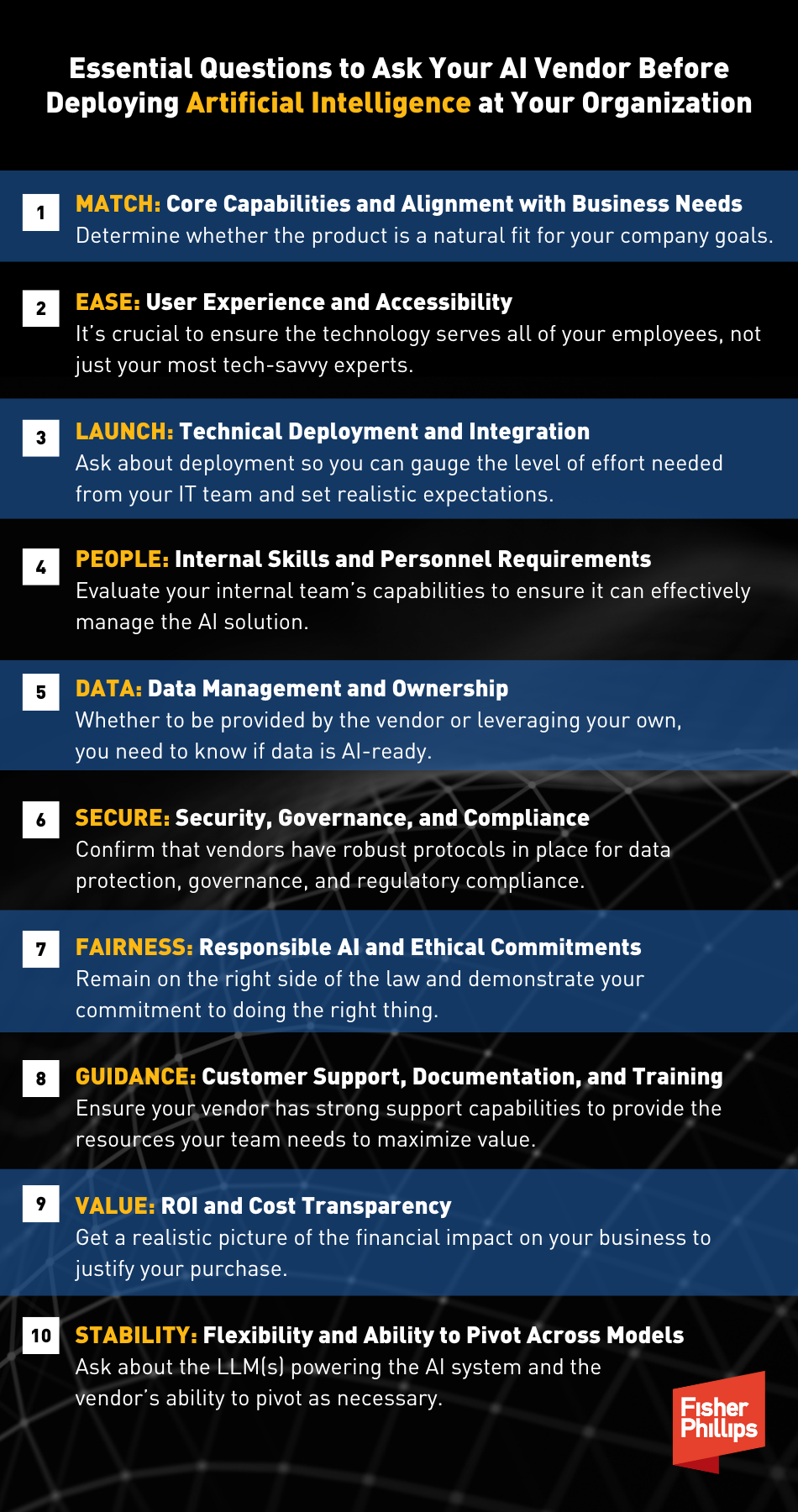Recent studies reflect that more than 75% of companies are either using or exploring the use of AI in their businesses, and more than 80% of employers consider AI a top priority in their future business plans. But finding the right AI vendor and AI solution isn’t just about choosing a product that supports your goals – it’s also about ensuring the AI system won’t bring you any unanticipated legal liability and disastrous reputational harm. Asking the right questions will help you nail down whether your vendor is truly ready to deliver value to your organization while also addressing the unique risks of adopting AI technology. Below are the critical areas to evaluate, designed to help you build a smart framework for your vendor selection process.

1. MATCH: Core Capabilities and Alignment with Business Needs
The first step in evaluating an AI vendor is determining whether its product is a natural fit for your company goals. Not all AI systems are created equal – some are optimized for specific tasks or industries, while others offer generalizable capabilities that adapt to unique workflows.
2. EASE: User Experience and Accessibility
No matter how powerful the AI system, it’s only valuable if your team can use it effectively. Ease of use, intuitive design, and training support are crucial to ensure the technology serves all of your employees, not just your most tech-savvy experts.
3. LAUNCH: Technical Deployment and Integration
Integrating a new AI solution with existing systems is complex, requiring a clear understanding of technical requirements and timelines. By asking questions about deployment, you can gauge the level of effort needed from your IT team and set realistic expectations for project completion.
4. PEOPLE: Internal Skills and Personnel Requirements
Even the most advanced AI systems require knowledgeable staff for successful implementation. You need to evaluate your internal team’s capabilities to ensure it can effectively manage the AI solution. For complex AI deployments, vendor expertise alone may not be enough – you might need additional training, support, or personnel.
5. DATA: Data Management and Ownership
AI Solutions are only as good as the data. Whether the primary data used by the AI solution is provided by the vendor or it will leverage your proprietary data, you need to know if your data is AI-ready or if time-consuming preparation will be required. Clarifying who owns the models, data, and AI output can avoid potential IP and privacy issues.
6. SECURE: Security, Governance, and Compliance
Data privacy and security are non-negotiable. Since AI systems require data to function, it’s essential to confirm that vendors have robust protocols in place for data protection, governance, and regulatory compliance.
7. FAIRNESS: Responsible AI and Ethical Commitments
Asking about ethics, transparency, and bias prevention shows you are serious about aligning with vendors who are committed to ethical AI practices – both in order to ensure you remain on the right side of the law but also to demonstrate your commitment to doing the right thing.
8. GUIDANCE: Customer Support, Documentation, and Training
Strong customer support is critical to a positive AI adoption experience. It ensures that your team has a reliable partner to turn to when questions arise or issues need to be addressed. A vendor with strong support capabilities will provide the resources your team needs to maximize the AI’s value.
9. VALUE: ROI and Cost Transparency
Your financial commitment of AI adoption might be substantial, and evaluating its return on investment is essential. Without clear insight into cost structure and potential ROI, it’s hard to justify the expense. Asking about costs and expected returns can give you a realistic picture of the AI’s financial impact on your business and allow you to justify your purchase to your superiors.
10. STABILITY: Flexibility and Ability to Pivot Across Models
The last thing you want is to spend the time, effort, and expense to roll out a fantastic new AI system, only to see it quickly become outdated – or worse, extinct. Make sure to ask about the large language model(s) powering the AI system, and the vendor’s ability to pivot as necessary.
Conclusion
Choosing an AI vendor is about more than just finding a tool – it’s about finding a partner who will work with your team to achieve your business goals securely, ethically, and effectively. The questions outlined here are designed to help you get started on your selection journey, but they’re only the beginning.